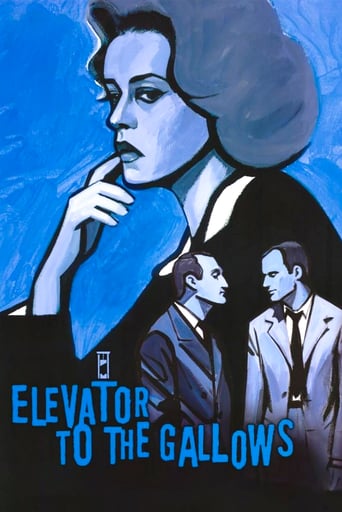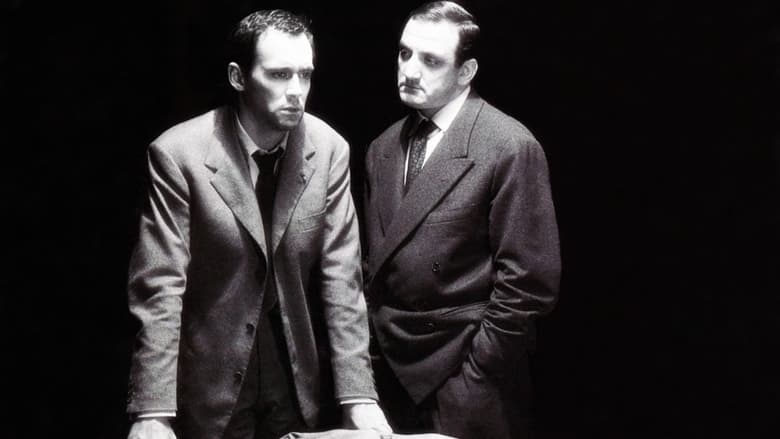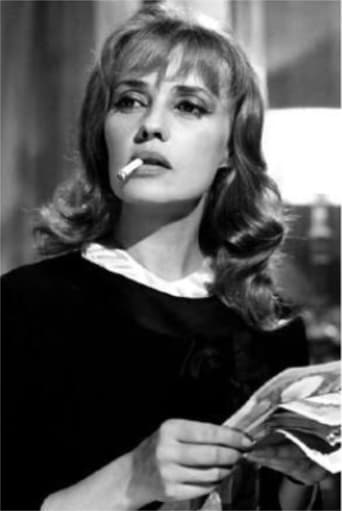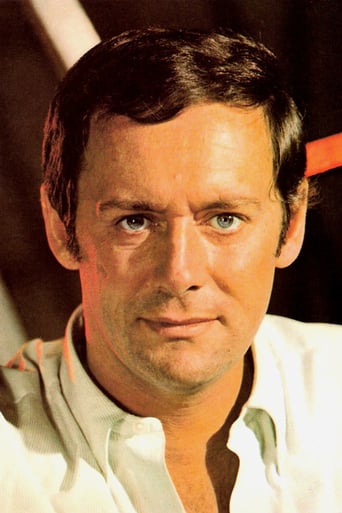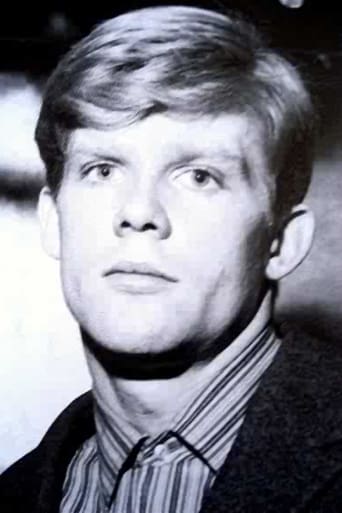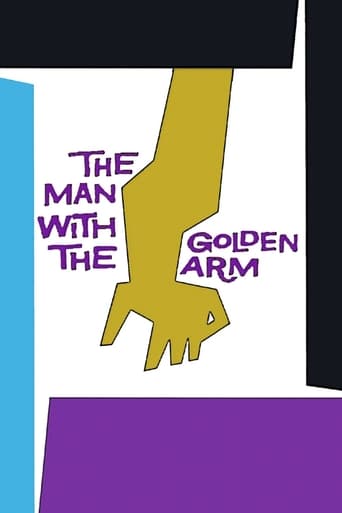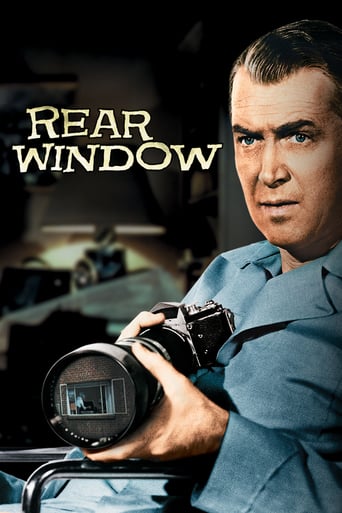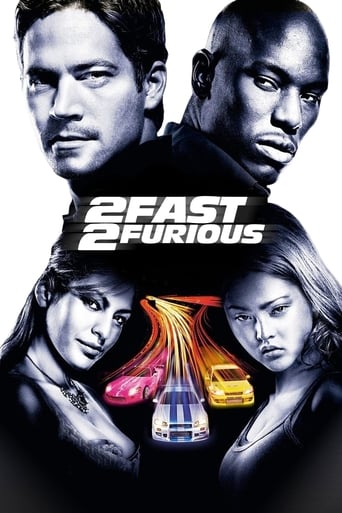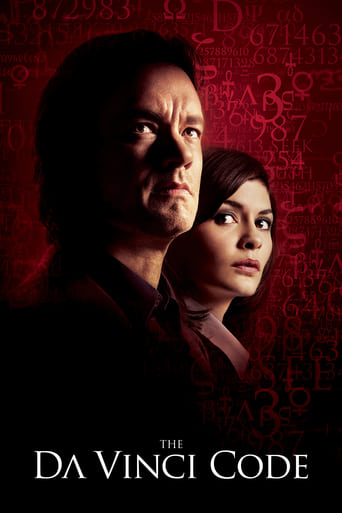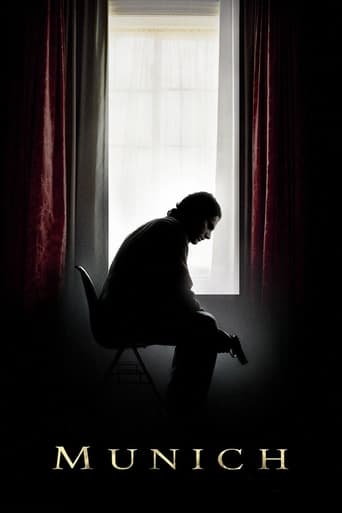Elevator to the Gallows (1958)
A self-assured businessman murders his employer, the husband of his mistress, which unintentionally provokes an ill-fated chain of events.
Watch Trailer
Cast


Similar titles
Reviews
I think this is a new genre that they're all sort of working their way through it and haven't got all the kinks worked out yet but it's a genre that works for me.
it is finally so absorbing because it plays like a lyrical road odyssey that’s also a detective story.
Great movie. Not sure what people expected but I found it highly entertaining.
what a terribly boring film. I'm sorry but this is absolutely not deserving of best picture and will be forgotten quickly. Entertaining and engaging cinema? No. Nothing performances with flat faces and mistaking silence for subtlety.
Louis Malle made his striking directorial debut in this French film, "Elevator to the Gallows" in 1958, with the script cowritten by him and Roger Nimier.Jeanne Moreau plays an unhappily married woman who colludes with her lover Tavernier (Maurice Ronet) to kill her husband (Jean Wall), for whom he works. Tavernier takes a gun, goes up to his boss' office via a rope out his own office window, and kills him. As he's leaving the building, he sees that he did not collect the rope. He leaves his car running, leaving his coat and gun inside while he runs in to retrieve the rope. Unfortunately, while he's in the elevator, the building is closed, and that includes the power. He's stuck.Meanwhile, two young people, an impulsive, cagey young man and his girlfriend from a flower shop (Georges Poujouly, Yori Bertin) steal Tavernier's fancy car and take off.Fabulous noir set in rainy France with captivating scenery and Miles Davis music, perfectly catching the atmosphere - Moreau, not knowing where Tavernier is, walking in the rain, going from bar to bar trying to find him; the two young lovers on an adventure, the girl with a romantic, Juliet-like attitude, the boy headstrong; Tavernier, smoking in the elevator as he works on how to get out; people still talking of the Occupation and war in Algiers...Malle weaves a fascinating story of fate and random circumstance.There isn't a lot of dialogue in this film, but the actions say it all. Paris in the rain and suspense - it doesn't get much better.
A self-assured business man murders his employer, the husband of his mistress, which unintentionally provokes an ill-fated chain of events.Journalist Barry Farrell wrote, "Moreau had 20 forgettable films behind her... Malle put Moreau under an honest light and wisely let his camera linger. The film was nothing special, but it did accomplish one thing: it proposed a new ideal of cinematic realism, a new way to look at a woman. All the drama in the story was in Moreau's face – the face that had been hidden behind cosmetics and flattering lights in all her earlier films." Farrell is certainly right about the portrayal of Moreau. How can you make a leading lady anything but glamorous? Malle found a way that was quite successful.As for the film being "nothing special", I think Farrell is wrong. A 1950s French film noir that is well executed? This is something we need more of. Starting with a murder and then spreading out from there, this is a good story of suspense, intrigue and all that. The whole concept of being caught in an elevator is incredible, and probably unprecedented.
Elevator to the Gallows, directed by Louis Malle, came out in France in 1958, the same year as Alfred Hitchcock's Vertigo- and they bear noticeable similarities. Indeed, the Criterion Collection's booklet on Elevator cites Hitchcock as an influence on Malle. Both films are about attempts to carry out the perfect murder, with classic motives. Both are atmospheric and rich. Elevator to the Gallows may not be as famous, and I think it's somewhat underrated- Leonard Maltin gave it a lukewarm rating and claimed it "doesn't hold up," but failed to explain how and by what standards. He even got the name of the movie wrong, calling it by its bastardized title Frantic. I'd say Malle's film is one of the best I've seen from France and from the 1950s.In it, Julien Tavernier kills a man named Simon Carala because he's in love with Carala's wife Florence, played by the beautiful Jeanne Moreau. He tries to make it look like suicide, then forgets a key piece of evidence outside the scene of the crime. Going back to get it, he gets caught in the elevator, while his car is stolen by a young couple. The young man impersonates Tavernier, and then commits a murder of his own, for which the real Tavernier is blamed by the French press (which evidently doesn't have to obey libel laws).Elevator is a very good yarn, as two separate murders happen to be thrown together as a wicked twist of fate, with guns fired not by their owners. Some reviewers have questioned how Tavernier could have forgotten such an important piece of evidence, but come on- he had committed a crime, and probably wanted to be done with it as quickly as possible; forgetting things is understandable under the stressful circumstances. Like Orson Welles with Citizen Kane, Malle made a real cinematic achievement at a young age, and more people should see this movie.
"Lift to the Scaffold" is quite a stunning film and a neat summation of all the lessons that had been learned about the art of film making up until the point of its release.Ostensibly a noir thriller dotted with elements of French farce, it makes complex use of cinematographic devices to develop its key themes. Largely the film is about the role of fate and how an unfortunate series of events leads to justice being served. It is also about how a woman's vengeful fury serves to destroy not only her lover but herself.That woman's psychological state throughout the film is highlighted in myriad ways. A lone figure, she walks aimlessly through places of socialisation in the city, such as cafés, oblivious to the rain that reflects her darkening mood. The use of a whispered monologue conveys her thoughts and a bleak jazz soundtrack her mood. Mobile cameras, outdoor steps and superb lighting during the close-ups of Moreau's face heighten the sense of isolation in a very concrete, modern world.The perfect crime is undone by coincidences including a telephone call at precisely the wrong moment, an elevator's power being cut for the night, the highly unlikely event of a car theft and the killer being accused of the wrong murder.Throughout the film, commentary is made on the nature of war. The murder victim is a ruthless profiteer who trades on the misery of others yet meets a violent end because he cannot pleasure his wife adequately. The murderer is known to be a ruthless, former military man yet there are questions if he is brave enough to kill now he can no longer hide in the cowardly world of the armed forces. The events in Indo-China and Algeria are also referenced as places where France is inflicting suffering to make the business world richer.There are also references to the German occupation of France but, whereas the Germans had moved on, they also note that the French are still committing atrocities in the name of imperialism.Despite this bleak narrative, there are moments of farce. Besides the key event of the car theft, a black cat appearing, ridiculously, on the tenth story balcony of the office block foretells of the disaster awaiting the murderer. Likewise, when he finally escapes from the lift, the vehicle standing where he had left his car is a comical three-wheeler.The interrogation scene is wonderfully filmed, the three key actors in that setting standing out from a black backdrop. Their drama is amusing and ironic to the audience as they know the killer is being interrogated for the wrong murders but it is played with total conviction and integrity.The final scenes are beautiful with the convicting photographic image fading into view. Likewise, the latter photos that convict Moreau's character lie tranquilly in their chemical baths against a black background in the dark room. Her reflection is then scene in this bath gazing down at herself in horror and guilt as she realises she is condemned to a lengthy prison sentence. It is her lack of forgiveness and quickness to accuse her lover that has led to her downfall. All she can do is futilely stroke his image, rippling the chemical bath.For its wonderful cinematography, lighting, music and acting, this film is a revelation. Likewise, it is a brave film commenting on the then-current events of what France was doing to its overseas colonies. The farcical humour and deliberately-contrived plot may be hard for some non-French to digest and, indeed, maybe an outright distraction but there is still a wonderful film to enjoy if one looks beyond that. Indeed, Malle here proves himself a craftsman at the top of his profession.

